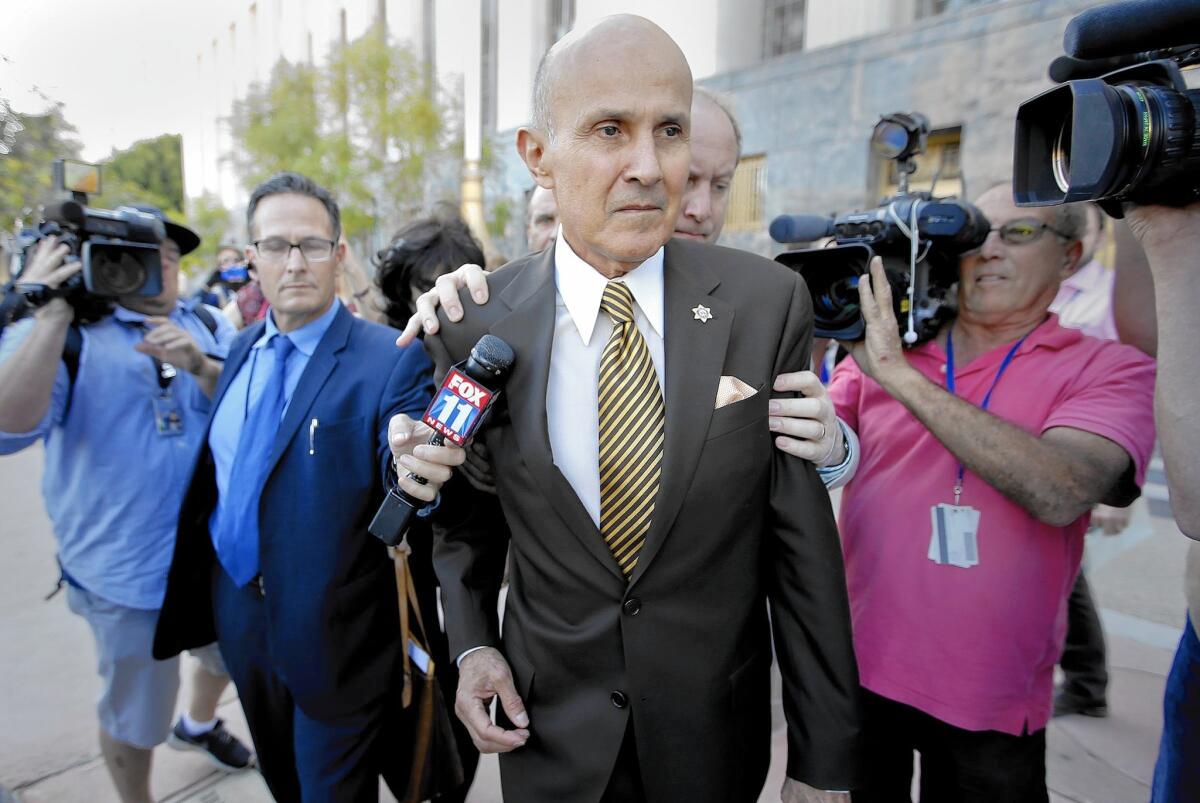Recorded interview reveals former Sheriff Lee Baca lying to a federal prosecutor

Former Los Angeles County Sheriff Lee Baca outside court in Los Angeles after pleading guilty Wednesday to lying to federal investigators.
The sheriffâs lie came 25 minutes into the interview.
It was an April afternoon in 2013, and a federal prosecutor was bearing down on Lee Baca, trying to find out how much he knew about his underlingsâ attempts to obstruct FBI agents investigating corruption and brutality by deputies inside his Los Angeles County jails.
Had he known in advance, the prosecutor asked, that two of his deputies were going to confront the lead FBI agent at her home?
âI wasnât aware of any of the ⌠particulars,â Baca said.
In fact, he knew all about it.
See more of our top stories on Facebook >>
It was the first of three lies prosecutors say Baca told federal authorities during the four-hour interview at his lawyerâs downtown office.
According to a recording of the confidential interview obtained by The Times, Baca portrayed himself as a hands-off manager who knew nothing about any attempts within his department to thwart the federal investigation. He instead cast blame on a long list of targets: immature deputies; sheriffâs managers who had wide latitude to supervise employees; even federal authorities themselves, for failing to alert Baca to their secret civil rights investigation.
The one person Baca didnât blame was himself.
That changed this week when Baca, as part of a deal he struck with prosecutors, admitted in court that he had lied about the encounter with the FBI agent. Federal prosecutors allege that the visit to the FBI agentâs home â along with a threat to arrest her â was an attempt to intimidate her and obstruct the federal investigation into the jails.
In testimony and interviews with federal authorities, some of Bacaâs subordinates contradicted what he told prosecutors. Baca, they said, instructed deputies to go to the agentâs home and interview her.
âJust donât put handcuffs on her,â Baca said, according to an FBI summary of an interview with a former sheriffâs captain.
Bacaâs guilty plea Wednesday to making a false statement marked a stunning reversal for the longtime law enforcement leader who had previously insisted he played no role in the jail scandal. In his plea agreement, the 73-year-old retired sheriff did not contest the other false statements prosecutors accused him of making in the interview.
Baca is the ninth former sheriffâs official to be convicted in the obstruction of justice case. He faces up to six months in prison under the terms of the deal he made with the U.S. attorneyâs office. His former second in command, retired Undersheriff Paul Tanaka, is scheduled to go to trial next month on charges he obstructed the FBI probe.
At the heart of the obstruction case is how sheriffâs officials responded when they discovered in 2011 that FBI agents were secretly investigating the jails and had gone so far as to smuggle a cellphone to an inmate working as a federal informant.
In the interview with prosecutors, Baca said he had always been willing to cooperate with the FBI, but he also made clear that he had been upset at the time about the federal agencyâs incursion into his domain.
âLet me say this,â he responded when a prosecutor asked him if he had ever told others he resented the FBI for investigating the jails. âResentment is not a word that I typically use on anything, including the FBI. Was I angry? Yes. Did I feel that it caused more difficulty than it should have? Yes.â
::
Baca was facing off against Brandon Fox, who had prosecuted public corruption cases in Chicago before coming to Los Angeles.
Foxâs precise delivery contrasted with Bacaâs off-topic discourses and occasionally combative tone.
Fox began the interview by assuring Baca that he was not a target of a federal criminal investigation. The prosecutor, however, warned that could change down the road.
The questioning soon turned to an emergency weekend meeting Baca attended with his staff days after learning about the smuggled cellphone.
âAre you talking about the Saturday meeting?â Baca asked.
âThe famous Saturday meeting,â Fox responded.
Baca, an avid runner, explained that he had been scheduled to compete in a road race the morning of Aug. 20, 2011, but scratched so he could attend the meeting.
Fox pressed the sheriff on whether he recalled any discussion about keeping FBI agents away from the inmate, Anthony Brown, who was providing information on corruption and beatings by deputies. Soon after the meeting, sheriffâs officials secreted Brown to a remote jail facility and registered him in the departmentâs computer system under fake names.
âWhether Saturday or ensuing days, Iâm not aware of any direct involvement with any conversation about keeping the FBI and Mr. Brown away from one another,â Baca said.
Prosecutors alleged in a complaint filed this week that Baca was not being truthful and that he did discuss keeping the FBI from Brown. According to the plea agreement, Baca ordered that Brown be isolated and that deputies investigate how Brown obtained the cellphone, putting Tanaka in charge of executing his orders.
As Fox continued to try to pin Baca down on the issue, the sheriff maintained that he had been concerned only about keeping Brown safe from other inmates as well as deputies, leaving the details of how to handle Brown to others.
I donât believe anyone should lie under any circumstances.
— Lee Baca, former L.A. County sheriff
Fox pointed out that other inmates who had made allegations about violent deputies were not treated the same way. The prosecutor asked whether the safety concerns were tied to Brownâs status as an FBI informant.
Baca evaded the questions, instead shifting blame onto the FBI for secretly investigating the jails without alerting him. If the FBI had asked him for access to Brown, he would have happily given it, Baca said.
âIf we had better communication, we would have had a different outcome,â Baca said.
::
Tensions grew between Fox and Baca as the interview stretched into the late afternoon.
The sheriff often responded to the prosecutorâs questions by straying off topic or turning questions into an opportunity to highlight his accomplishments.
At one point, Fox asked whether the FBIâs investigation had led to fewer cases of deputies beating up jail inmates.
It wasnât the federal inquiry, Baca replied, but his own policies and practices that triggered the improvement. He launched into a defense of his leadership in the jails before asserting that many young deputies are afraid of inmates and âarenât even able to get in a serious fight.â
Baca, who had not worked as a line deputy for decades and has a lean runnerâs physique, described himself as a âpencil neck.â
âAn inmate could kick my butt real easy. But it has to be a big one, not a medium-sized one,â he told Fox.
The culture of the jails, he continued, was âus versus them,â with the inmates as the enemy and deputies the âgood guys.â To change that dynamic, he said, jails should ensure that deputies are responsible for educating inmates.
Fox did manage to get straight answers when he inquired whether Baca knew that sheriffâs deputies had interrupted and ended a jailhouse interview between FBI agents and the inmate informant.
âNo,â Baca said flatly.
âNo,â he said again when asked if Greg Thompson, a lieutenant working in the jails, had apologized to him for allowing the FBI agents to speak with the informant.
Federal prosecutors allege Bacaâs denials were false. Thompson had gone to Baca after the agents met with Brown, promising it would not happen again, according to Bacaâs plea agreement.
Fox noted that tensions between the FBI and the Sheriffâs Department eased at one point in the late summer of 2011 â a âcalm periodâ that happened to coincide with Bacaâs vacation. Baca returned to work days before his deputies confronted the FBI agent at her home on Sept. 26, 2011.
âWhile youâre gone, things get a little bit better.... And then you get back, and then four days later, [sheriffâs deputies] are at Leah Marxâs house threatening to arrest her. Is there some sort of cause and effect ⌠based on something you did?â Fox asked.
Baca insisted he knew nothing about the incident at the agentâs home until receiving a phone call from the head of the FBIâs Los Angeles office. According to the plea agreement, however, Baca had attended a meeting the day before, instructing the deputies to approach Marx and do everything short of putting handcuffs on her.
In the interview, Baca said a threat by one of the deputies to arrest the FBI agent was inappropriate and an âimpulsive reaction.â
Did the deputy actually intend to arrest her, or was he bluffing? Fox asked.
âI donât believe anyone should lie under any circumstances,â Baca replied.
[email protected] | Twitter: @joelrubin
[email protected] | Twitter: @CindyChangLA
MORE ON L.A. JAILS UNDER SCRUTINY
Ex-Sheriff Lee Bacaâs guilty plea caps a âsad sagaâ of corruption
Editorial: Justice finally catches up with Sheriff Lee Baca â who helped deny it to others
Why ex-L.A. Sheriff Lee Baca gets to keep his pension even if he goes to jail for lying
More to Read
Sign up for Essential California
The most important California stories and recommendations in your inbox every morning.
You may occasionally receive promotional content from the Los Angeles Times.












